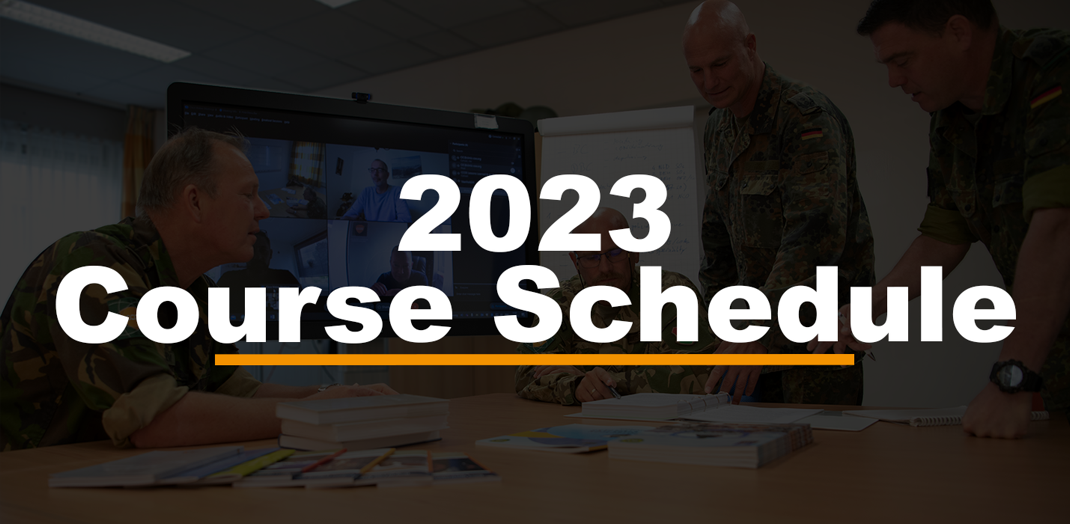CIMIC Messenger 2022-12
Dear CIMIC Community,
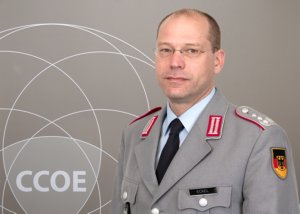
I am very delighted to introduce the 2022 final CIMIC Messenger to the CIMIC community of Interest. I hope that you are all safe and that the plans and aspirations for the year materialized or at least the try was undertaken.
The year 2022 was still affected by the COVID pandemic but was since 2020 the first one with a graduate way back to normal business. Starting from the online modus we shifted our focus back to presence events but still kept the advantages of online and hybrid solutions as a permanent element of our inventory to offer education and training – like our well-received online seminars for instance.
This year very quickly proved with full force the return of major crises and even more the significant overlap of multiple crises at the same time. NATO and EU woke up with major threats to security and stability for the Euro-Atlantic area – ranging from full-scale war, economic crisis, pandemic, and energy shortages, to name just a few.
Consequently, deterrence, defence, and comprehensive politico-economic actions had to be decided with significant impacts on all areas of public and individual life. We, the military, had to cope again with major military operations but at the same time have to realise that a holistic understanding of the environment has a prominent place in the overall military domain. Multiple overlapping crises might become the new “normal”. A holistic assessment, an understanding of the different factors, and a comprehensive approach to crisis management are pivotal. The inclusion of the civil situation and themes like resilience are critical and need our full commitment and ability to convince the decision-makers.
The CCOE education and training events reflect those developments and saw some more specific tailoring to the required content as needed by the customers and stakeholders of the courses.
The concept and doctrine process speeded up in 2022 with the update of the policy and the doctrine for CIMIC. Both breathe the changing times and challenges ahead of us all.
The personnel carousel moved as well at the CCOE. The Lessons Learned & Analysis Branch (LL&A) saw a complete overturn in personnel as well as the directorate executed the tri-annual rotation between The Netherlands and Germany. Besides that, the USA seconded a permanent liaison officer from the Civil Affairs (CA) Branch to the CCOE to support and facilitate the increasing CIMIC and CA cooperation.
The upcoming year 2023 will for sure offer some more challenges to cope with, such as the ongoing war in Ukraine, the pressure on the Alliance to adapt and accelerate our common efforts to strengthen the capabilities for deterrence, and the need to defend the Euro-Atlantic area.
For the CCOE a pretty filled-up course calendar, the new content, and the various support requests from ACO, ACT, EU, and nations will keep us utmost busy. The close cooperation with US CA, the new Analysis and Assessment Course and CIMIC training for our Allies and partners like Ukraine are just some examples of a pretty busy 2023.
We, the CCOE-team, hope to provide you with this messenger some insights into those current and future developments and the vision for the way ahead to increase the relevance of CIMIC and act as the recognised hub of knowledge and expertise in CIMIC.
Topics of this edition of the CIMIC Messenger:
· Change of Command of the Director and Deputy Director CCOE
· CIMIC Awards of Excellence 2022
· A Formal Foundation for a Partnership Established with Leiden University
· The First CIMIC Liaison Training Tailored for NATO Troops in Art 4/5 in Liepaja, Latvia
· CCOE Seminar Series - A Success Story to be Continued
· Developments and Achievements in the Training and Education Branch
At this point I would like to thank my team of the CCOE and the wider group of shareholders and friends for their outstanding engagement and support to the mission accomplishment of the CCOE to connect people, share collective knowledge and gain unity of purpose in the field of Civil-Military Cooperation.
We all deserve a Merry Christmas and some days off to charge the batteries for the challenges to come.
Enjoy reading, make use of the information provided and pass it on. You know where to find us; be it our web-page, Facebook and LinkedIn, or expectantly in The Hague, the International City of Peace and Justice!
Best Regards,
Colonel Andreas Eckel
DIRECTOR CCOE
(Photos: CCOE/ A.Bier, Th. Dillschnider, A. Döhring, D. Patzke; Leiden University, PAO MNCG)
Change of Command of the CCOE Director and Deputy Director
Nothing is as constant as the change in military life, the CCOE’s directorate executed the tri-annual rotation between The Netherlands and Germany again. The rotation started with the Director in June followed by the Deputy Director/Chief of Staff (DDIR/COS) in September.
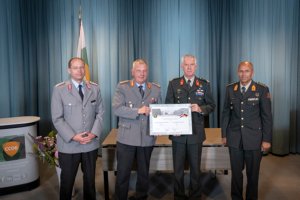
On June the 22nd the CCOE-Team welcomed several international guests at the Majoor Jan Linzel Complex, The Hague to conduct the Change of Command Ceremony from Colonel of the Royal Netherlands Army Frank van Boxmeer to Colonel (GS) German Army, Andreas Eckel. This ceremony was embedded in the extraordinary 24th CCOE Coordinating Committee (CC) Meeting. The chairman of the CC, Italian Army Colonel Mattia Zuzzi, guided all the attendees in a cheerful way through the ceremony. With signing the acknowledgement paper, the post of the Director CCOE was handed over in the presence of the Dutch Brigadier General Jan Blaquiere (Director International Military Staff, NLD Ministry of Defence) and the German Brigadier General Andreas Henne (Deputy Commander German Armed Forces Territorial Command) from Colonel Frank van Boxmeer to Colonel Andreas Eckel. Col van Boxmeer led the CCOE since 2019 and left the CCOE for his next position at the Allied Joint Force Command Brunssum.
After the German General Staff Course the new Director, Colonel Eckel served in various positions and lately as Assistant Chief of Staff (ACOS) J9 in the Multinational Joint Headquarters in Ulm before he became Director CCOE. From 2014 to 2016 he was the Branch Chief Concepts, Interoperability, Capabilities (CIC) Branch, and from June 2015 to July 2016 he was also acting Deputy Director and Chief of Staff CCOE.
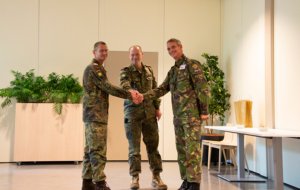
On September 28th the staff of the CCOE bid farewell to the leaving Deputy Director and Chief of Staff (DDIR/COS) Colonel, DEU Army Joachim Miller. Colonel Miller joined the German Army in 1985 and studied Civil Engineering at the Military University of Applied Sciences in Munich, Germany. Since 2001 he worked in the Civil-Military Cooperation-Community. Some highlights were without any doubt his assignment as CJ 9, Commander Striking Fleet Atlantic, Norfolk, VA USA, the CIMIC Desk officer at the German Ministry of Defence and his time as Commander of the German Armed Forces Civil Military Cooperation Centre. Colonel Andreas Eckel thanked Colonel Miller for all his efforts and very good work during his more than three years as the DDIR/COS of the CCOE, and wished him all the best for his soon upcoming retirement. The duties and responsibilities were transferred to his successor Colonel of the Royal Netherlands Army Henk Paape.
Col Paape started his military carrier as a conscript at the 42 Mechanised Infantry Battalion at Seedorf, Germany. As a professional officer in the Maintenance Regiment, he led an extended maintenance platoon during IFOR-1 in Bosina. As a side step, he got the position of Deputy Battalion Commander of the 103 ISTAR Battalion. After his General Staff officers course and his graduation as Executive Master of Security and Defence, he served as Deputy G5 at the Dutch Army Command at Apeldoorn/The Hague. Before he was assigned as the new DIR/COS of the CCOE he was the Assistant Chief of Staff (ACOS) J9 at the Joint Support and Enabling Command (JSEC) at Ulm, Germany. He lives with his family at Zeewolde.
New definition of CIMIC and its transition into doctrine development
Initiated by NATO International Military Staff’s task for revision of the Military Policy on Civil-Military Cooperation and Civil-Military Interaction in 2020 (MC 411/3 – still under development) the definition of Civil-Military Cooperation (CIMIC) was updated, to ensure its applicability in support of all NATO core tasks. After a bottom-up process through ACO CIMIC & CMI Sub Working Group, Working Group and Steering Committee, the NATO Terminology Board agreed to the new definition in August 2022. The new definition is more specific with regard to the contributing activities of the Joint Function of CIMIC to enable commanders and their force “to prepare, plan, orchestrate and execute synchronized activities across all domains and environments, at scale and speed in coordination with other instruments of power, partners and stakeholders” in a multi-domain environment.
The current continuum of competition requires constant consideration and application of CIMIC as crucial function within NATO’s Military Instrument of Power to ensure civil, civil-military and military activities and operations in support of military strategic objectives contributing to ensure security interests.
Definition: Civil-military cooperation (CIMIC) is a military joint function that integrates the understanding of the civil factors of the operating environment and that enables, facilitates and conducts civil-military interaction, to support the accomplishment of missions and military strategic objectives in peacetime, crisis and conflict.
The definition includes two core activities in support of the joint function CIMIC:
1. Civil factor integration (CFI), as practical translation of “the integration of the civil factors of the operating environment”.
2. Civil-military interaction (CMI), which includes civil outreach, civil engagement, and civil-military liaison.
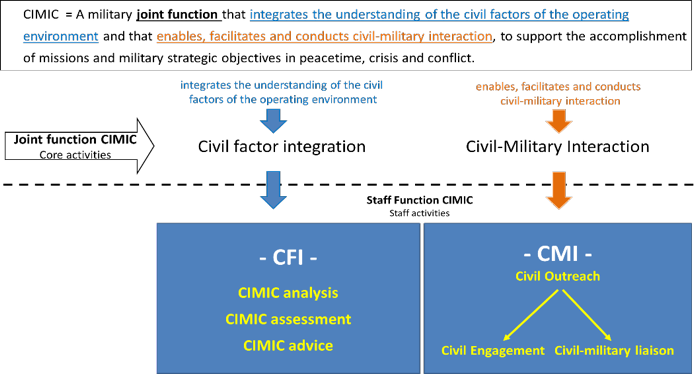
To make sure these core activities are well developed, planned and executed in support of NATO and NATO-led military activities and operations, both are reflected in the staff function CIMIC. Current development of the new AJP 3.19 CIMIC will explain how the staff can operationalise the core activities.
Civil factor integration will focus on civil factor analysis and assessment and enables the staff to provide CIMIC advice in support of decision-making. Civil-military interaction includes civil outreach, civil engagement and civil-military liaison. Civil Outreach activities are a first step aiming to create opportunities to engage or liaise with non-military actors.
CIMIC, by definition, “supports the accomplishment of missions and military strategic objectives”. Through its core activities, the joint function CIMIC aids the commander to synchronise military and non-military actions and activities in order to create converging effects and contributes to attaining the desired end state in a comprehensive approach.
In a further breakdown of its military-internal impact, well-executed CIMIC preserves combat power, maximizes the freedom of action and by that maintains or increases the operational tempo. Synchronisation of military activities and operations with non-military complimentary actions creates synergies which increase effectiveness and efficiency on both ends, and also minimize unintended, unnecessary, negative interference.
The benefit of the reviewed CIMIC definition is evident: it underlines that CIMIC is a joint function and is helping commanders in conjunction with other joint functions, to integrate military actions with non-military activities in order to deliver converging effects to ensure a comprehensive approach to all NATO Core Tasks.
Furthermore, it brings clarity to the “CIMIC” versus “CMI” discussion. CIMIC refers to the joint function and the staff function and it includes both core activities, CFI and CMI.
Civil-military liaison is a sophisticated form of CMI. Therefore it makes sense that CIMIC-staff elements and CIMIC-units have sub-elements and sub-units specifically qualified and trained for Civil-military liaison.
CIMIC Awards of Excellence 2022
This year’s Institutional CIMIC Award of Excellence was presented in September to the town of Motta di Livenza, Italy followed in October by the individual CIMIC Award bestowed to Professor Dr Klaus Beckmann, the president of the Helmut–Schmidt–University (University of the German Federal Armed Forces) in Hamburg.
Since 2017 - the 10th Anniversary of the CCOE - the CIMIC Award of Excellence has been positioned as the CCOE’s marque reach-out and management symbol towards the wide array of civilian, institutional and administrative stakeholders in the Civil-Military Cooperation (CIMIC) Community of Interest worldwide. It is a unique and individually branded medal, which will be handed over to the Awardees. It consists of the two-sided Medal, a high-quality box and as a remembrance a certificate within a special frame. Two medals will annually be handed over to an individual for her/his personal engagement (Individual Award) and to an institution (Institutional Award). With the CIMIC Award of Excellence, the Directorate of the CCOE intends to honour outstanding contributions in rising the visibility of CIMIC worldwide.
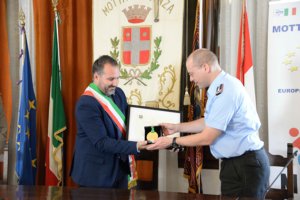 On September 22th our Director, Colonel Andreas Eckel, and the Commander of the Multinational CIMIC Group (MNCG) in Motta di Livenza, Colonel Ugo Proietto, presented the 5th Institutional CIMIC Award of Excellence to the town of Motta di Livenza, Italy, presented by the mayor, Mr Alessandro Righi. During a ceremony in the town hall, the mayor accepted the award on behalf of the local community with enthusiasm. The garrison town of Motta di Livenza has been host to the Italian Army and NATO partner units for more than 120 years. For 21 years it’s been the home of the MNCG and maintains a great relationship with the city and the population of Motta di Livenza. On special events with high public recognition value, the cooperation between the Italian Army and the town, as well as city-sponsored actors from public and cultural life, has been exemplary. The MNCG has cooperated with the city of Motta di Livenza extensively during the last years, promoting several initiatives, including a non-competitive race to foster solidarity (since 2019), a World War I exhibition (2020) and a collaboration agreement to promote cultural growth (2021). The town has supported training and educational events by providing infrastructure and high-level role players.
On September 22th our Director, Colonel Andreas Eckel, and the Commander of the Multinational CIMIC Group (MNCG) in Motta di Livenza, Colonel Ugo Proietto, presented the 5th Institutional CIMIC Award of Excellence to the town of Motta di Livenza, Italy, presented by the mayor, Mr Alessandro Righi. During a ceremony in the town hall, the mayor accepted the award on behalf of the local community with enthusiasm. The garrison town of Motta di Livenza has been host to the Italian Army and NATO partner units for more than 120 years. For 21 years it’s been the home of the MNCG and maintains a great relationship with the city and the population of Motta di Livenza. On special events with high public recognition value, the cooperation between the Italian Army and the town, as well as city-sponsored actors from public and cultural life, has been exemplary. The MNCG has cooperated with the city of Motta di Livenza extensively during the last years, promoting several initiatives, including a non-competitive race to foster solidarity (since 2019), a World War I exhibition (2020) and a collaboration agreement to promote cultural growth (2021). The town has supported training and educational events by providing infrastructure and high-level role players.
About three weeks later on 17th October 2022 the Director of the CCOE, Colonel Andreas Eckel, presented the 5th individual CIMIC Award in the presence of the Mayor of The Hague, Jan van Zanen, to Professor Dr Klaus Beckmann for his commitment in originating and implementing the study programme Master of Arts Civil-Military Interaction (MCMI). This study programme aims to prepare future military executive personnel to perform command functions and executives of Governmental, Non-Governmental and Independent Organizations for careers across the spectrum of Civil-Military Interaction.
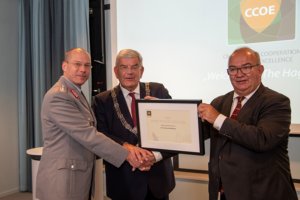 “Our CCOE is the preferred network campus to connect people, share collective knowledge and gain unity of purpose in the field of Civil-Military Cooperation,” welcomed Colonel Eckel. “I am delighted to welcome the Mayor of The Hague - our Landlord - and many members of the CIMIC-Community at the Majoor Jan Linzel Complex”. In 2013 as the CCOE considered extending its work into academic affairs, Beckmann was the one believing in the potential and value of also having first-hand practitioners' experience of military missions in Civil-Military Cooperation within their portfolio. The Professor and his team managed the formal accreditation process of the Masters of Art Civil-Military Interaction (MCMI) in 2016. ”What I keep are great memories of a project and lasting cooperation built on trust, mutual respect, appreciation, and friendship. The two years of developing the MCMI have been quite intense, but also a good personal learning for myself. It makes me proud that I had the chance to be a part of this pioneering work for the future of civil-military education,” Dr Marian Corbe, a former member of the CCOE and co-developer of the MCMI, stated in his laudation.
“Our CCOE is the preferred network campus to connect people, share collective knowledge and gain unity of purpose in the field of Civil-Military Cooperation,” welcomed Colonel Eckel. “I am delighted to welcome the Mayor of The Hague - our Landlord - and many members of the CIMIC-Community at the Majoor Jan Linzel Complex”. In 2013 as the CCOE considered extending its work into academic affairs, Beckmann was the one believing in the potential and value of also having first-hand practitioners' experience of military missions in Civil-Military Cooperation within their portfolio. The Professor and his team managed the formal accreditation process of the Masters of Art Civil-Military Interaction (MCMI) in 2016. ”What I keep are great memories of a project and lasting cooperation built on trust, mutual respect, appreciation, and friendship. The two years of developing the MCMI have been quite intense, but also a good personal learning for myself. It makes me proud that I had the chance to be a part of this pioneering work for the future of civil-military education,” Dr Marian Corbe, a former member of the CCOE and co-developer of the MCMI, stated in his laudation.
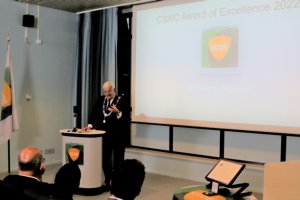 Ceremonies like this are always a perfect opportunity to increase and deepen the personal network within and beyond the CIMIC-community, as every year since 2017, (except for 2020 – due to Corona) the CIMIC Award of Excellence has been presented to an individual and an institutional awardee to recognize and honour institutions and individuals improving and further developing the role CIMIC plays in a modern environment.
Ceremonies like this are always a perfect opportunity to increase and deepen the personal network within and beyond the CIMIC-community, as every year since 2017, (except for 2020 – due to Corona) the CIMIC Award of Excellence has been presented to an individual and an institutional awardee to recognize and honour institutions and individuals improving and further developing the role CIMIC plays in a modern environment.
A formal foundation for a partnership established with Leiden University
As a hub for expertise and a think-tank, the CCOE is always looking for valuable partnerships in the civilian, more specifically, in the academic world to enlarge its own network and ensure the integration of academic thinking and methods into its own procedures and products. The Hague is a very international city and a perfect place to network, as it hosts numerous organisations, agencies and companies as well as faculties. One of them is Leiden University. Its Faculty of Governance and Global Affairs (FGGA) is providing high-quality interdisciplinary education and research on major societal, security, public policy, administration and governance issues. FGGA aims to strengthen scientific, academic and policy-oriented knowledge, to train students and professionals, and to contribute to society through wide-ranging impact and sustained valorisation. Within FGGA, the Institute of Security and Global Affairs (ISGA) focuses on major contemporary issues of security and global affairs in theory and practice. ISGA cooperates extensively with the Netherlands Defence Academy (NLDA) in the research group on War, Peace and Justice. Therefore, the university is a perfect match for the CCOE when it comes to connecting with a global network of international students and researchers.
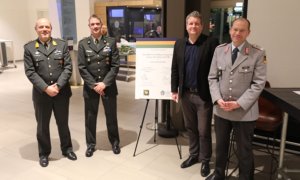 The CCOE and the FGGA agreed on working together in seeking opportunities to jointly develop educational initiatives and to exchange information in order to enable scientific research, within its limits of classification. Other key points of this cooperation are internship opportunities for students interested in the field of Civil-Military Cooperation and opportunities for interdisciplinary and applied research on issues related to security and defence as well as national, European and global civil-military matters. The intention is to strengthen the connection between academic research and practical application. One dimension is the application of academic methods and results in concepts, policy and doctrine and the transfer from there into Training and Education, the other dimension is to have academic lecturers and lectures in the course landscape.
The CCOE and the FGGA agreed on working together in seeking opportunities to jointly develop educational initiatives and to exchange information in order to enable scientific research, within its limits of classification. Other key points of this cooperation are internship opportunities for students interested in the field of Civil-Military Cooperation and opportunities for interdisciplinary and applied research on issues related to security and defence as well as national, European and global civil-military matters. The intention is to strengthen the connection between academic research and practical application. One dimension is the application of academic methods and results in concepts, policy and doctrine and the transfer from there into Training and Education, the other dimension is to have academic lecturers and lectures in the course landscape.
The Director of the CCOE, Colonel Andreas Eckel and the Deputy Director, Colonel Henk Paape, followed the invitation of Leiden University and joined the organised panel discussion and the formal signing ceremony on November 24th 2022. The so-called “Spanish Steps”, located in an open entry hall, allowing a broader auditorium was an appropriate location for this special event. Many students and interested listeners followed a very interesting and topic-related discussion about “NATO in European and Global Security: the Role of Civil-Military Cooperation” and took the opportunity to join the following question and answer session. The CCOE and the FGGA agreed on working together in seeking opportunities to jointly develop educational initiatives and to exchange information in order to enable scientific research, within its limits of classification. Other key points of this cooperation are internship opportunities for students interested in the field of Civil-Military Cooperation and opportunities for interdisciplinary and applied research on issues related to security and defence as well as national, European and global civil-military matters. The intention is to strengthen the connection between academic research and practical application. One dimension is the application of academic methods and results in concepts, policy and doctrine and the transfer from there into Training and Education, the other dimension is to have academic lecturers and lectures in the course landscape.
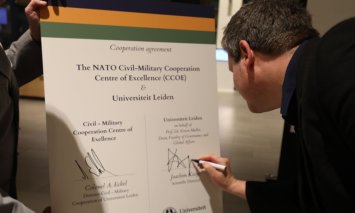 After that, the auditorium witnessed the representatives of FGGA Professor Joachim Koops and of the CCOE Colonel Andreas Eckel signing the Letter of Intent, as the highlight of this whole event, followed by a reception at the nearby café. This is the formal foundation for a partnership that has to be put to life with engagement and commitment, to make this beneficial for both entities and the customers of their products and services.
After that, the auditorium witnessed the representatives of FGGA Professor Joachim Koops and of the CCOE Colonel Andreas Eckel signing the Letter of Intent, as the highlight of this whole event, followed by a reception at the nearby café. This is the formal foundation for a partnership that has to be put to life with engagement and commitment, to make this beneficial for both entities and the customers of their products and services.
The First CIMIC Liaison Training tailored for NATO Troops in Article 4/5 in Liepaja, Latvia
The centre of gravity and focus of modern conflicts for NATO has transitioned in response to world events. With this transition, CIMIC operations have changed as well. The function is now primarily operating in Allied nations instead of failed states. While many core functions remain there is a massive change to how business is conducted in a fully functioning country. Using Latvia as the primary example during the tailored Liaison Course, all CIMIC efforts are conducted by, with and through the Host Nation’s (HN) own CIMIC.
The CIMIC operator in Latvia needs to focus on working by, with and through HN CIMIC, understand the laws and legalities of the nation, understand that setting conditions to enable manoeuvre elements needs to happen well before conflict erupts, and shift the focus through civil-military liaison to military to military (mil to mil) liaison.
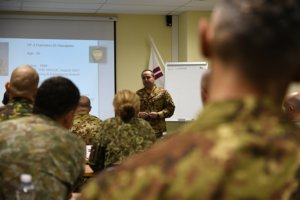 Understanding the laws and your legal restrictions within the Area of Operation (AO) will also assist in maintaining credibility and understanding what tasks are outside of the CIMIC Operator’s Area of Responsibility (AOR). Conducting meetings or CIMIC assessments without the HN approval or without a HN representative might lead to a degradation of the confidence and credibility of local and HN authorities in the communities and country that you are operating in.
Understanding the laws and your legal restrictions within the Area of Operation (AO) will also assist in maintaining credibility and understanding what tasks are outside of the CIMIC Operator’s Area of Responsibility (AOR). Conducting meetings or CIMIC assessments without the HN approval or without a HN representative might lead to a degradation of the confidence and credibility of local and HN authorities in the communities and country that you are operating in.
While many of the tasks and core functions remain the same, the majority of defining the civil environment needs to happen prior to the start of an emergency or conflict in this case.
The main bulk of the engagements are done mil to mil, CIMIC to CIMIC. Engagements with the civilian populace when they do happen will also involve the HN counterpart as the HN have an interest in what we do and conduct within their country and how to deconflict their interests within the alliance military.
With the focus on mil-to-mil liaison, the CIMIC operator needs to be briefed and updated on the difference between permissive versus non-permissive, Allied and non-Allied countries and the situation in which we are currently in. Importance must be stressed on the sharing of information, coordination and cooperation with the Host Nation. This will help to push positive messaging, to build and maintain credibility in the AOR, and the positive relationships with their enablers will assist and make tasks easier to complete due to the knowledge they hold.
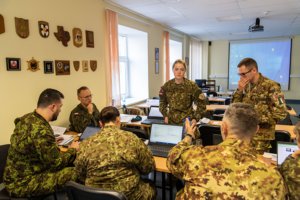 So from 17-21 October for the first time, 24 participants from eight nations (DEU, EST, ITA, LTU, LVA, NLD, POL, USA) enhanced their knowledge of how to conduct CIMIC tasks in a NATO Article 4/5 scenario at the Naval Training Centre in Liepaja, Latvia. The course was focused on CIMIC Liaison activities that ensure the integration and increase the interoperability of NATO forces deploying to Allied Nations. Instructors from Germany, Italy, The Netherlands, Poland, and Latvia supported this course, contributing to NATO's deterrence and defence efforts. New in the course layout was also that the participants had the opportunity to liaise with real local authorities. So our sincere thanks go again to the security managers of the harbour company, the manager of the Airport Security Department, and the representative of the train station and especially to the External Affairs Coordinator of Liepaja’s Municipality.
So from 17-21 October for the first time, 24 participants from eight nations (DEU, EST, ITA, LTU, LVA, NLD, POL, USA) enhanced their knowledge of how to conduct CIMIC tasks in a NATO Article 4/5 scenario at the Naval Training Centre in Liepaja, Latvia. The course was focused on CIMIC Liaison activities that ensure the integration and increase the interoperability of NATO forces deploying to Allied Nations. Instructors from Germany, Italy, The Netherlands, Poland, and Latvia supported this course, contributing to NATO's deterrence and defence efforts. New in the course layout was also that the participants had the opportunity to liaise with real local authorities. So our sincere thanks go again to the security managers of the harbour company, the manager of the Airport Security Department, and the representative of the train station and especially to the External Affairs Coordinator of Liepaja’s Municipality.
CCOE Seminar Series - A success story to be continued
The rapid changes in the security environment consistently provide new challenges to both the military and non-military actors. Thus, all involved in Civil-Military Cooperation (CIMIC) require a high level of understanding, agility and adaptability to cope with these developments and to stay prepared for future ones to come.
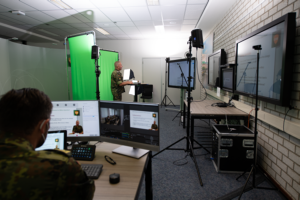 With topics ranging from conceptual developments to practitioners’ experiences, CCOE Seminars deliver a foundation to relate the community of interest’s demand for information on subjects related to CIMIC and beyond with the respective expertise. Next to the experts' presentations, plenty of space is reserved for a moderated question-and-answer session in order to stipulate a fertile exchange of ideas.
With topics ranging from conceptual developments to practitioners’ experiences, CCOE Seminars deliver a foundation to relate the community of interest’s demand for information on subjects related to CIMIC and beyond with the respective expertise. Next to the experts' presentations, plenty of space is reserved for a moderated question-and-answer session in order to stipulate a fertile exchange of ideas.
Bimonthly, the CCOE provides a platform to engage virtually with the community of interest. What started as a mitigation measure for COVID-related restrictions proved to be added value with huge benefits. In the virtual environment, the CCOE has increased its leverage and the audience has become more diverse. So far, the number of seminar attendees is ranging from 60 to more than 200 with a huge increase in transcontinental contributors and participants.
Another advantage is that the presentations, discussions, background literature and the biographies of the contributing invited experts are archived and available on our homepage.
So far the following topics have been explored:
1. Misinformation and Disinformation
2. Climate Change and its Implications for Military Operations
3. NATO CIMIC and US Civil Affairs – A Crosswalk
4. Resilience in the Cyber Domain
5. Societal Resilience – Conceptual Observations Meet Practitioners’ Experience
6. A Civil-Military Response to Hybrid Threats
7. Engaging in Civil-Military Information Sharing
8. Viewing the Civil Environment through PMESII/ASCOPE
9. Structured Analytic Techniques
10. Dissecting Structured Analytic Techniques (SAT): Strengths, Weaknesses and Limitations
11. Understanding order, stability, and security in fragile areas
The CCOE will continue this success story in 2023 and is looking forward to respond to suggestions by the Community of Interest. Thus, feel encouraged to submit future topics of interest to the CCOE Seminar Team.
Developments and achievements in the Training and Education Branch
The Training and Education (T&E) Branch has scheduled the training iterations as announced during the Annual Discipline Conference (ADC) in June this year. For a detailed overview please have a look at our course schedule.
We intend to execute six Staff- and Fieldworker trainings, of which three iterations will be conducted in The Hague. The other three respectively are in Nienburg, Germany, Kielce, Poland, and Szentendre, Hungary. The Higher Command Course will be held in The Hague two times as well as the Liaison Course. Finally, three Functional Specialist Courses are scheduled, of which one is foreseen in Apeldoorn (NLD). We need to have a look at Liaison Courses as such.
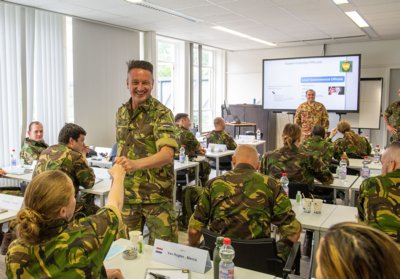 The current highlight of our new training is the NATO CIMIC Analysis and Assessments Course (NCAAC). The course is aimed at an audience on the Operational Level but is also accessible to those who are confronted and challenged by making profound and professional analysis and assessments of the civil environment and actors. After the successful completion of the pilot course based on our Training Needs Analysis (TNA) workshop, we conducted in May, we will execute two iterations in 2023.
The current highlight of our new training is the NATO CIMIC Analysis and Assessments Course (NCAAC). The course is aimed at an audience on the Operational Level but is also accessible to those who are confronted and challenged by making profound and professional analysis and assessments of the civil environment and actors. After the successful completion of the pilot course based on our Training Needs Analysis (TNA) workshop, we conducted in May, we will execute two iterations in 2023.
The Liaison Course provides a deep dive into the way CIMIC soldiers conduct Liaison activities. Our latest Liaison Course, executed in Liepaja, Latvia, was focussed on CIMIC Liaison activities that ensure the integration and increase the interoperability of NATO forces deploying to Allied Nations, contributing to NATO's deterrence and defence efforts. CCOE T&E Branch will assess the possibility of an adaptation or copying the current Liaison Course regarding the situation related to Article 4 and 5 scenarios. We have had a very positive experience in Latvia and are aiming for the continuation of this training, be it a tailor-made Mobil Training Team (MTT) or a second CIMIC Liaison Course.
CCOE T&E also took part in the Training Needs Analysis (TNA) for Cultural Property Protection (CPP) in the International Centre for Training and Research on Cultural Heritage in Danger in Wroclaw, Poland. CPP is a very important aspect of CIMIC activities as many CIMIC units put into life a lot of good practices concerning CPP in NATO operations.
As our last activity in December our MTT is to provide an European Mission Preparation Course in the United States at the US Civil Affairs Command (CACOM) on Staten Island, New York for a US Civil Affairs Unit. It is a tailored training to prepare US Civil Affairs personnel to deploy to the Balkans, fully focused on what to expect from NATO CIMIC in this region and how to assure most effective interoperability.
The CCOE CIMIC Messenger is a publication of the CIMIC Centre of Excellence. Its dedicated aim is to provide a forum or platform for stimulating and presenting innovative and comprehensive thinking on NATO CIMIC related issues such as Mission experiences, concepts, doctrine or lessons learned. The views and opinions expressed or implied in the CCOE CIMIC Messenger are those of the authors and should not be construed as carrying the official sanction of NATO, of any national armed Forces or those of CCOE.
“See you in The Hague!”
![]()

